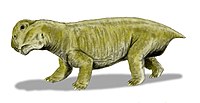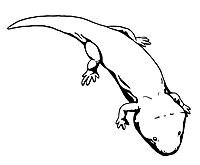Panchet Formation
| Panchet Formation | |
|---|---|
| Stratigraphic range: Early Triassic, | |
| Type | Geological formation |
| Underlies | Supra Panchet Formation |
| Overlies | Raniganj Formation |
| Location | |
| Coordinates | 23°36′N 87°00′E / 23.6°N 87.0°E |
| Approximate paleocoordinates | 55°30′S 60°12′E / 55.5°S 60.2°E |
| Region | West Bengal, Jharkhand |
| Country | |
The Panchet Formation is an Early Triassic geological formation from the Damodar Valley of India.[1][2]
It is among the few geological formations outside of Russia, South Africa, and China that documents the recovery of global ecosystems immediately after the Permian-Triassic extinction. It shares similar traits to some of these other formations, including the dominance of Lystrosaurus and the primary predators being proterosuchid reptiles. It also preserves a diversity of temnospondyl amphibians.[3][4]
Palaeobiota
Synapsids
| Genus | Species | Location | Stratigraphic position | Material | Notes | Images |
|---|---|---|---|---|---|---|
| Lystrosaurus |
L. murrayi |
A lystrosaurid dicynodont. Synonyms include L. orientalis and L. rajurkari. | 
| |||
| L. cf. curvatus | A lystrosaurid dicynodont. | |||||
| L. cf. declivis | A lystrosaurid dicynodont. | |||||
| Panchetocynodon | P. damodarensis | A cynodont of uncertain affinity. | ||||
| Thrinaxodon |
T. bengalensis |
A thrinaxodontid cynodont. | Considered a nomen nudum. The specimen is lost. |
Amphibians
| Genus | Species | Location | Stratigraphic position | Material | Notes | Images |
|---|---|---|---|---|---|---|
| ?Benthosuchidae indet. | ||||||
| Capulomala | C. panchetensis | A plagiosaurid temnospondyl. | ||||
| Gonioglyptus |
G. fragilis |
A trematosaurid temnospondyl. | ||||
| G. longirostris | ||||||
| Indobrachyops | I. panchetensis | A rhytidosteid temnospondyl. | 
| |||
| Indolyrocephalus | I. huxleyi | A trematosaurid. | ||||
| Lydekkerina | L. sp. | A lydekkerinid temnospondyl. | 
| |||
| Pachygonia | P. incurvata | Possibly a brachyopid temnospondyl. | ||||
| Manubrantlia | M. khaki | A lapillopsid temnospondyl | 
| |||
| Tupilakosaurus | T. sp | A tupilakosaurid temnospondyl. | 
|
Reptiles
| Genus | Species | Location | Stratigraphic position | Material | Notes | Images |
|---|---|---|---|---|---|---|
| Samsarasuchus | S. pamelae | A proterosuchid archosauriform. | ||||
| ?"Teratosaurus" | T. bengalensis | A dubious archosauriform represented by a single tooth, formerly considered a rauisuchian but most likely a proterosuchid.[3] | ||||
| Ankistrodon | A. indicus | Dubious proterosuchid. | ||||
| Neodiapsida indet. | A non-archosauromorph diapsid, known from an ilium.[4] |
Fish
| Genus | Species | Location | Stratigraphic position | Material | Notes | Images |
|---|---|---|---|---|---|---|
| Acrolepidae indet. | An acrolepid fish. | |||||
| Perleididae indet. | A perleidid fish. | |||||
| Chondrichthyes indet. | A cartilaginous fish. | |||||
| Ceratodontidae indet. | A ceratodontid lungfish. |
See also
- Yerrapalli Formation - Middle Triassic (Anisian?) of the Pranhita–Godavari Basin
- Denwa Formation - Middle Triassic (Anisian?) of the Satpura Basin
- Tiki Formation - Late Triassic (Carnian?) of the Rewa Basin
- Lower Maleri Formation - Late Triassic (Carnian?) of the Pranhita–Godavari Basin
- Upper Maleri Formation - Late Triassic (Norian?) of the Pranhita–Godavari Basin
- Lower Dharmaram Formation - Late Triassic (Norian-Rhaetian?) of the Pranhita–Godavari Basin
References
- ^ Romano, Marco; Bernardi, Massimo; Petti, Fabio Massimo; Rubidge, Bruce; Hancox, John; Benton, Michael J. (2020). "Early Triassic terrestrial tetrapod fauna: a review". Earth-Science Reviews. 210: 103331. doi:10.1016/j.earscirev.2020.103331.
- ^ Bandyopadhyay, Saswati; Ray, Sanghamitra (2020-03-01). "Gondwana Vertebrate Faunas of India: Their Diversity and Intercontinental Relationships". Episodes. 43 (1): 438–460. doi:10.18814/epiiugs/2020/020028. ISSN 0705-3797.
- ^ a b Ezcurra, Martín D.; Bandyopadhyay, Saswati; Sengupta, Dhurjati P.; Sen, Kasturi; Sennikov, Andrey G.; Sookias, Roland B.; Nesbitt, Sterling J.; Butler, Richard J. (25 October 2023). "A new archosauriform species from the Panchet Formation of India and the diversification of Proterosuchidae after the end-Permian mass extinction". Royal Society Open Science. 10 (10). doi:10.1098/rsos.230387. ISSN 2054-5703. PMC 10598453. PMID 37885992.
- ^ a b Ezcurra, Martín D.; Bandyopadhyay, Saswati; Sen, Kasturi (March 2022). "A new faunistic component of the Lower Triassic Panchet Formation of India increases the continental non-archosauromorph neodiapsid record in the aftermath of the end-Permian mass extinction". Journal of Paleontology. 96 (2): 428–438. doi:10.1017/jpa.2021.100. ISSN 0022-3360.
